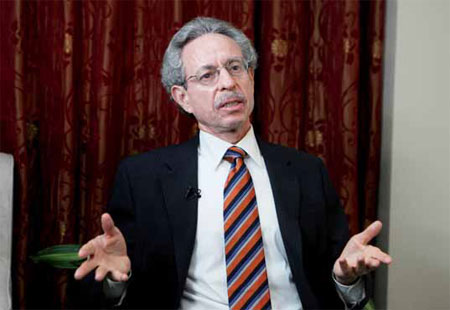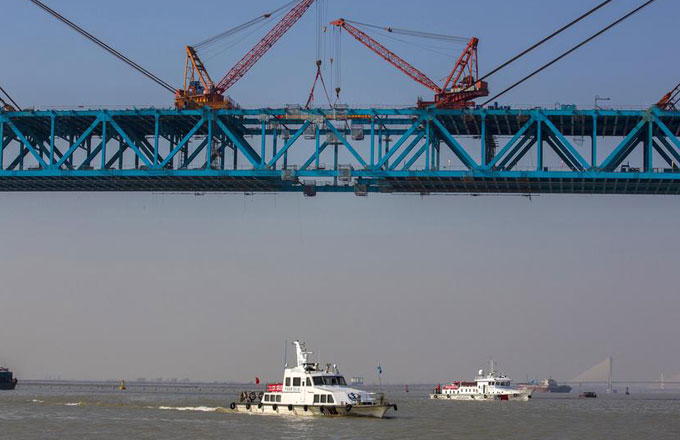

New York-born banker and author has an insider's understanding
Robert Lawrence Kuhn says the West often doesn't understand the Chinese leadership's key priorities for China. The 67-year-old American is seen by many as one of the few figures outside the world's second-largest economy who actually does.
He is regarded as a knowledgeable insider, having been an adviser to a number of leading Chinese bodies since the late-1980s and knowing many of the country's top political figures personally.
 |
|
Robert Lawrence Kuhn says China's growth is good for the world, but it cannot 'save the world'. Feng Yongbin / China Daily |
"There is rarely alignment between what topics China's leaders think are important about China and what the world thinks," says Kuhn, also an international corporate strategist and investment banker. "Understanding China requires knowing the difference."
He was speaking recently in the five-star Grand Hyatt hotel in central Beijing, which is his home for 90 days a year. He divides the rest of his time between his three homes in the United States and traveling elsewhere.
"They treat me very well here. Even when I travel around China, I keep a room here," he says.
The hotel is well placed near China's seat of government around Tian'anmen Square where he has an extensive network of contacts.

His latest book, How China's Leaders Think: The Inside Story of China's Past, Current and Future Leaders, which is now out in paperback and runs to more than 500 pages, goes into extensive detail about those who have the responsibility for shaping modern China.
Kuhn, who cuts a dapper figure, says many in the West often have an outdated view about modern Chinese leaders.
"The reality is that China's leaders are meritocratic," he says.
"Many have strong academic backgrounds from top universities and all have significant experience, often having run two or more provinces or major municipalities as Party secretary, governor or mayor."
Kuhn, who is also a new China Daily columnist, is much in demand from major news organizations around the world and makes TV appearances on BBC, CNBC, Euronews and Bloomberg TV. He says he has had complete freedom to express his opinions.
"I have written three books about China, and dozens of articles and columns. I've produced two major TV documentaries about China and given scores of media interviews - and never has anyone in China even requested to censor anything I've published or broadcast outside of China," he says.
Some in the West, however, have accused him of being too much of an insider and not giving the full picture about China because he was too close to the leadership.
"I deem it vital, considering China's importance in the world, that China's leaders become more known to the world, and known not just via sound-bites and photo ops, but by seeing them up close as real people - hearing their own words, listening to their stories, getting their ways of thinking. I'm pleased to facilitate some of this," he says.
"I also offer my own analysis. As for my accuracy and understanding, readers or viewers can judge for themselves."
Kuhn, who was born in New York, began his career as a scientist. After studying biology at Johns Hopkins University, he did a doctorate in anatomy and brain research at the University of California at Los Angeles in the 1960s. Brain science and consciousness remain major interests of his.
His first involvement in China was through the scientific community when he worked with scientists reforming China's research and technology base.
He received an invitation from Song Jian, then a State councilor and chairman of the State Science and Technology Commission.
At the time he was developing a parallel business career and became president of The Geneva Companies, a leading US mergers and acquisitions company, which he eventually sold to Citigroup in 2000.
At the same time he was cementing links with leading business and political figures in China.
His organization, The Kuhn Foundation, with China Central Television, produced the documentary In Search of China for PBS in the US, which was broadcast in 2000.
He is now working on a new five-part series, China's Challenges, which will be broadcast in China in the autumn and syndicated to PBS stations in the US next year.
Perhaps Kuhn's most significant project was writing a biography of former president Jiang Zemin, which was the best-selling book in China in 2005.
How China's Leaders Think was based on interviews with more than 100 leading Chinese political figures, some of whom he has known for more than a decade.
"I know many personally and have worked with several for a number of years. When you hear them speak over a period of time, it gives you a sense of their personalities and character as well as their intellectual capabilities, leadership style and political progress," he says.
Kuhn sometimes likes to invoke humor to explain why there is sometimes friction between Chinese and American leaders.
"Some people think it is because of ideological, historical or cultural reasons that we have communication problems. As I once pointed out, perhaps it's because China's leaders, the members of the Politburo Standing Committee, were trained as engineers, and most American politicians were trained as lawyers. Maybe the problem is that lawyers and engineers can't talk to one another!"
Kuhn says the main focus in the West is often the Chinese economy and whether it will continue to motor ahead.
"China should have 10 to 20 more years of what we should still call relatively high growth, driven by continuing the country's unprecedented urbanization and modernization.
"Growth rates will naturally ease from reform's historic averages - probably to 6 to 8 percent per annum - which is less than we are used to, but which may be optimal because China can more effectively deal with its most severe problems, particularly economic and social imbalances and sustainable development.
"However, China's economy is fragile, vulnerable to exogenous shock. China's growth is good for the world, but it cannot 'save the world'," he says.
Kuhn says there is often a danger of China being misrepresented because it is seen through a narrow perspective.
"Western media takes China's very real problems and reports them as if they were, say, 80 percent of China's story. I take the same problems - which are genuine and often intractable - and they make up, say, 35 percent of my work," he says.
"It is not that Western media is conspiratorially biased or always anti-China, it is that they often do not provide proper and sufficient context," he says.
Huang Tiantian, Dong Fangyu and Zheng Yibing contributed to this story.
andrewmoody@chinadaily.com.cn







